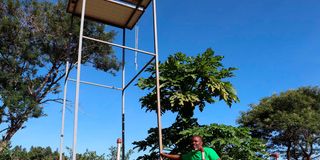Farmers dodge drought through credit facility for solar water pumps

Jonah Kitetu displays the solar panels that pump water for his farm
What you need to know:
- In general, the entire Makueni County is dry.
- Even as other regions recorded above average rainfall during this years’ rainy season of March, April and May it remained way below average in Makueni.
As people from arid and semi arid regions suffer under severe droughts caused by climate change, it is all smiles for Jonah Kitetu and his wife Damaris from the semi-arid Makueni County because the scorching sun is now helping them produce sufficient food for their family and surplus for the market.
In a village known as Ukia,off the Machakos – Wote Road, their two-acre piece of land, now known as Jodam Smart Farm, stands out from the surrounding dry thorny shrubs, owing to the flourishing lush green vegetables, bananas and legume. All these were grown through irrigation using a solar powered water pump they recently acquired via a loan.
“With a shallow well I sunk a few years ago and now with this solar powered equipment, my household has become food-secure and we are able to supply fresh vegetables to the local market on a daily basis throughout the year,” said the 48-year-old farmer, who makes at least Sh2,000 from vegetables every day.
From the proceeds, he has managed to pay off his loan in full and now he is planning to acquire more solar equipment to invest on a different farm he purchased a few years ago. “Before this, I used to irrigate using a petrol powered water pump. But given the ever-rising cost of fuel, it became a very costly affair and I found myself making losses throughout,” said the farmer.
In general, the entire Makueni County is dry. Even as other regions recorded above average rainfall during this years’ rainy season of March, April and May it remained way below average in Makueni.
However, with access to groundwater and use of Regenerative Agriculture techniques, Kitetu and his wife are among hundreds of households that have learned how to adapt to the tough climatic conditions using solar pumps.
The couple is among the 270 farmers who have acquired the solar powered water pump through an ongoing intervention by IKEA Foundation, which links smallholder farmers to manufacturers and suppliers of such environment friendly equipments through an affordable credit model.
In January 2021, the IKEA Foundation in partnership with EnDev started to promote the Productive Use of Energy in Kenya, Uganda and Ethiopia as a way of improving smallholder farmers’ livelihoods and increasing their resilience to climate change while contributing to reduction of the greenhouse gas emissions.
According to John Ngigi of SNV (a not-for-profit development organisation founded in the Netherlands), smallholder farmers suffer from the impact of climate change not because they do not have the knowledge to adapt, but mostly because they cannot afford the necessary equipment that can help them cope. Based on a study by the UN Food and Agriculture Organization, Solar Powered Irrigation System can help buffer the effects of drought and overcome water stress during seasons when groundwater is the only available water source, or when surface water has to be hauled over long distances.
In Makueni County, SNV collaborates with solar company known as SunCulture through a model known as Pay-As-You-Grow, where farmers are allowed to pay in small monthly instalments. They also undertake on-site product demonstrations and build capacities of the farmers to select effective technologies such as use of solar water pumps.
“When I was linked to this company, I was taken through several solar irrigation solutions so that I could make an informed decision,” said Kitetu.
“Based on the agreement, I paid Sh7,000 upfront and in a week, the equipment was delivered at my doorstep and installed immediately,” he said. From there, he has been paying Sh4,100 every month for a total of Sh82,500.
“Paying the instalments is an easy task for me because I have plenty of leafy vegetables on my farm, and given that I am farming in a dryland area, the demand is always very high,” he said.
“Through this project, we intend to incorporate the use of affordable renewable energy technologies and services for irrigation, cooling and drying for smallholder farmers in dairy and horticultural value chains to help achieve increased productivity, improved nutrition, higher incomes, and improved climate-resilient food systems,” said Ngigi.





